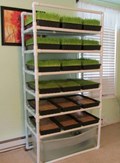
Several Haryana districts have prohibited the sale of dry fodder made of wheat straw, paddy, mustard, and guar to brick-kiln or cardboard factories, and have also begun a campaign to prevent tractors loaded with fodder from transporting it to other areas, amid a wheat shortage caused by low yield.
Wheat straw is used as animal fodder, and the intense heatwave has caused shortages, affecting the state's maintenance of cow shelters.
Wheat yield has been reduced by 4-8 quintals per acre due to the dry spell. Farmers in the state have opposed the government's ban order, citing a lack of fodder for livestock owners and gaushalas (cow shelters).
Prices have risen from 300 to 700 per quintal. So far, four districts have ordered a ban on the sale and transportation of wheat straw outside of the state.
Neighboring state Punjab has also reported a low wheat yield despite a significant increase in demand.
On Sunday, Punjab Chief Minister Bhagwant Mann urged the Centre to relax shrivelled grain norms in the purchase of wheat from the state without imposing any value cut.
Wheat growers in Punjab have reported a decrease in crop yield and shrivelled grains as a result of the early arrival of a heatwave.
Mann stated that the AAP government is committed to purchasing all grain from farmers. He went on to say that blaming farmers and penalising them for shrivelled grains is completely unfair because the growers have no control over this.
The Russian invasion of Ukraine has also had an impact on wheat sales in Punjab, as the two countries are the largest exporters of wheat on the international market. Private players in the agricultural sector have turned to Punjab to fill supply gaps. Punjab's total wheat purchases have surpassed a 15-year high.
















